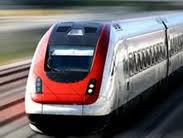Last
week, China opened the world’s
longest high speed rail line. From
Beijing the line runs 1,428 miles south to Guangzhou, roughly the distance from
New York City to Key West. At an average
speed of 186 mph, the 1000-passenger, 16-car trains will cover the distance in
eight hours. Trains depart every 10 to 12
minutes in each direction.
Though
construction of high speed rail only began in 2007, by 2015 China will have a
national network of over 11,000 miles of high speed rail lines carrying more
than 3 billion passengers annually.
Envious? Sure.
Why can’t we build something like that in the US? Lots of reasons. But consider what we are building.
By
2016, Connecticut will have a new commuter rail line, its first in decades,
running 60 miles from New Haven through Hartford and on to Springfield MA. The $647 million project is fully funded ($388
million in Federal money, $259 million in state bonding) and is on, if not
ahead of, schedule.
The
double track line will eventually offer trains every half-hour, carrying an
estimated 1.7 million passengers a year.
Today, Amtrak diesels chug along the line on a single track offering
eight trains a day carrying 380,000 passengers a year. (PS: It remains to be seen who will run this new
state-owned railroad, Amtrak or some other operating agency.)
While
most Amtrak passengers are connecting in New Haven to Northeast corridor
trains, this new “Knowledge
Corridor” line will offer not only seamless cross-platform connections to
Acela, Metro-North and Shore Line East, but point-to-point service among its 13 stations.
At
three stations there will be connections to CTfastrak
(the new $567 million bus rapid transit system opening in 2015). And at Windsor Locks you’ll be able to hop
off the train, onto a shuttle bus and be at Bradley airport in just minutes. Eventually there may be through trains north to
Montreal and east to Boston via the inland route.
There
are plans for 200 – 300 parking spaces at most stations. But the real hope is that TOD (Transit
Oriented Development) will work its magic and people will be able to live,
commute to work and get back home without a car.
The
economic potentials are amazing: work in
downtown Hartford or New Haven but live, shop and eat in Wallingford or Windsor
and never have to own a car! Already the
land around the proposed stations is being grabbed up for development.
 Another
issue for the communities served by the new rail line will be the 32 grade
crossings. More trains will mean more
gates dropping across busy roadways and more warning horns being sounded.
Another
issue for the communities served by the new rail line will be the 32 grade
crossings. More trains will mean more
gates dropping across busy roadways and more warning horns being sounded.
One
thing the new rail line will not be is “high speed” (125+ mph). Earlier hype about bullet trains running parallel
to I-91 has been replaced with more reasonable expectations: the new trains will cover the 60 miles
between New Haven and Springfield just eight minutes faster than existing
Amtrak trains (thanks mostly to raised platforms and less ‘dwell time’ at
stations). But what they lack in speed
they will more than make up for in frequency of service.
For
more information on Connecticut’s newest rail line, visit their website: http://www.nhhsrail.com



.jpg)
